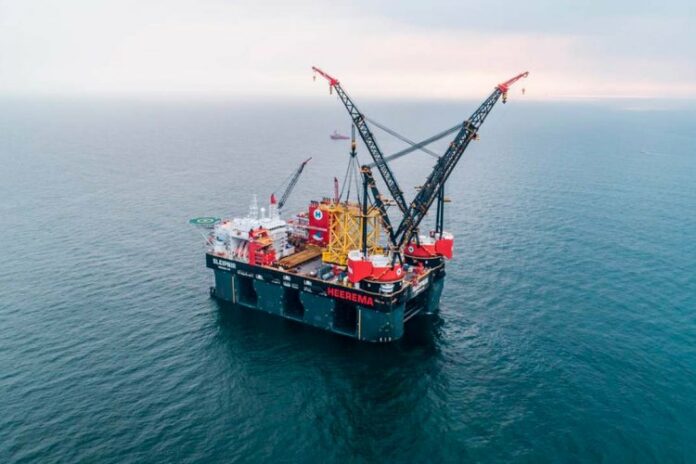The fourteen 2GW converter stations will be installed in the Dutch and German parts of the North Sea. The framework agreement covers at least twenty-eight slots until 2031; fourteen slots for transport and installation of a jacket and fourteen slots for transport and installation of a topside.
Heerema will deploy the Semi-Submersible Crane Vessel (SSCV) Sleipnir as well as an owned floatover barge, Allseas will use its single-lift installation vessel Pioneering Spirit for the installation of the jackets and topsides. Both vessels have been used several times in recent years to install jackets and topsides for TenneT in the Dutch and German North Sea.
Heerema has been awarded about 60% of the available slots, while Allseas has been awarded approximately 40% of the slots. Additional work can be added to the awarded contracts. The awarded slots are not linked to specific 2 GW projects. The HVDC suppliers building the jackets and topsides for TenneT (Hitachi Energy/Petrofac, GE/Sembcorp, GE/McDermott and Siemens/Dragados) can choose from the suppliers whereby Heerema and Allseas can install both jackets and topsides.
Boskalis will act as a subcontractor to Allseas, building one or two new transport vessels specifically for the 2GW Program that will meet the most stringent future legislation standards on sustainability and emissions.
Tim Meyerjürgens, COO at TenneT, says:
“With this agreement we secure global marine transport and the heaviest offshore installation capacity in the market for our HVDC partners while expanding transport capacity in the market. We are proud to have signed this framework agreement with these Dutch and Swiss-Dutch suppliers. These European partners once again prove that they are global market leaders in offshore transport and installation. They have the equipment to carry out projects of such magnitude safely and successfully.”
Recently, TenneT awarded framework agreements for the civil works for the land stations in the Netherlands, offshore and onshore converter stations and the cable connections of the fourteen 2 GW projects in the Netherlands and Germany. The new tendering approach accelerated the process, with agreements being reached with all suppliers in a short period of time. Marco Kuijpers, Director Large Projects Offshore at TenneT:
“With the partnership values in these long-term agreements, we offer a strong basis for the successful implementation of the projects. These contracts give planning certainty and predictability to our suppliers, which they need to invest.”
Pieter Heerema, Allseas’ President, said: “We are delighted that Allseas’ superior single-lift technology has been selected to help TenneT realise its ambitious 2GW Program, and play a key role in Europe’s energy transition. When my father, Edward Heerema, devised the single-lift concept in 1987, no one could have envisioned it would be deployed for a landmark offshore energy project of such strategic importance four decades later. Pioneering Spirit’s unique transport and installation capability has been used to great effect to deliver critical assets for offshore wind developments across Europe. The ship’s large lift capacity and high workability ensure that the installations can be safely performed all year round, creating maximum flexibility in the vast and complex building schedules. We look forward to strengthening our relationship with TenneT and getting started on this prestigious project.”
Jeroen van Oosten, Heerema’s Chief Commercial Officer said:
‘We are proud to be selected to work alongside TenneT to deliver clean energy for the Netherlands and Germany. The award of this framework agreement is an important showcase of the benefits of forming trust-based partnerships between clients and contractors. To ensure clean energy demands are met, there should be a continued focus on collaborative, forward-looking agreements that recognize the need to secure transport and installation capacity.’



